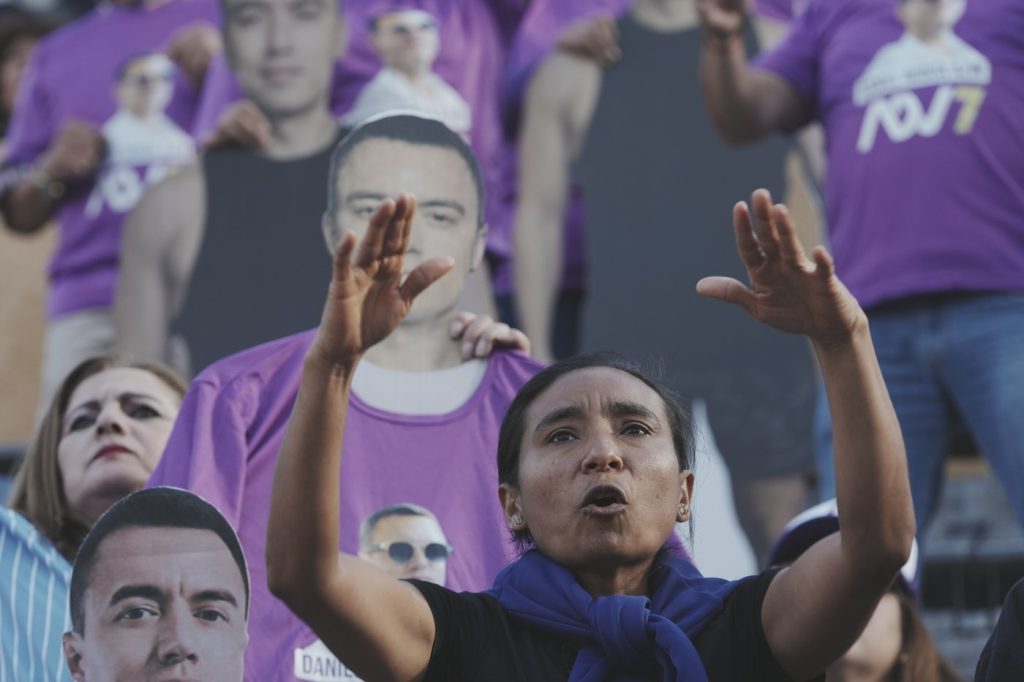GUAYAQUIL, Ecuador (AP) — In a surprising twist during the 2023 snap election, Daniel Noboa emerged as a prominent candidate despite having only a limited political background, managing to surpass several seasoned contenders. The 37-year-old conservative millionaire, known as an heir to a significant banana trade fortune, advanced to a runoff election against Luisa González, the protégé of Ecuador's most influential president of the 21st century. Noboa not only secured a place in the runoff but also shocked the nation by winning the presidency for a 16-month term.
As he heads into an election this Sunday, Noboa is vying for a full four-year term. This would permit him to continue implementing his aggressive crime-fighting measures, which have gained favor among certain segments of the electorate, though they have raised concerns regarding legal and ethical boundaries. "You can see that he is trying to take out criminals," commented Diego Morales, a security guard in Quito, who lauds Noboa's efforts against the escalating violence impacting Ecuador over the past four years.
Noboa initiated his political trajectory in 2021 by winning a seat in the National Assembly, where he chaired the Economic Development Commission. Before entering politics, he started his own event organizing company at age 18 and worked within his father's Noboa Corp., taking on various management roles in shipping, logistics, and commerce. His presidential journey escalated when he defeated leftist lawyer Luisa González in the October 2023 runoff, a result of former President Guillermo Lasso's decision to dissolve the National Assembly and curtail his own tenure.
In the upcoming election, Noboa faces 15 other candidates, including González, who has ties to former President Rafael Correa, known for his socially conservative policies that polarized public opinion during his decade-long administration. For a candidate to win outright, they must secure 50% of the votes or at least 40% with a ten-point advantage over the nearest rival. Should neither scenario play out, a runoff is scheduled for April 13.
During Noboa's presidency, the country has witnessed a decrease in the homicide rate, which dropped from 8,237 (46.18 per 100,000 people) in 2023 to 6,964 (38.76 per 100,000 people) the following year. Hugo Acero, a security consultant, noted, "I think that the citizens for the most part recognize his effort to improve security," suggesting that such improvements could secure Noboa the necessary votes for re-election. However, the homicide rate remains significantly elevated compared to pre-crisis levels, with figures from 2019 showing just 1,188 homicides (6.85 per 100,000 people). By January 2024, Ecuador recorded its deadliest month on record, with 731 homicides, particularly concentrated in Guayaquil.
Noboa's approach to crime has stirred controversy both domestically and internationally. After declaring a state of internal armed conflict in January 2024, he mobilized military forces to address organized crime in various locations, including prisons. Amongst his most contentious actions was the authorization of a police raid on the Mexican embassy in Quito to apprehend former Vice President Jorge Glas, a fugitive living there for months. Critics expressed disbelief at these decisions, raising questions about adherence to international conventions and legal norms.
Additionally, Noboa's governance style included delegating presidential powers to Vice President Verónica Abad, while he campaigned earlier this year, sparking concerns about the implications of such moves. Tensions between them escalated quickly, resulting in Noboa appointing Abad as ambassador to Israel—an action considered by her as a form of forced exile from his administration.
Experts, such as Maria Cristina Bayas from the University of the Americas, assert that Noboa has not hesitated to leverage the law and the Constitution to align circumstances with his preferences. If re-elected, these patterns are likely to persist, prompting a focus on the balance between decisive governance and upholding democratic norms.










